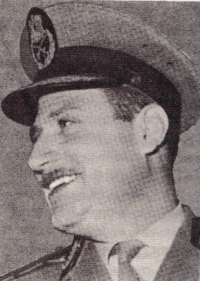Muhammad Umran
| Muhammad Umran محمد عمران | |
|---|---|
 | |
| Minister of Defence | |
| In office 1 September 1965 – 14 February 1966 | |
| Preceded by | Hamad Ubayd |
| Succeeded by | Hafez al-Assad |
| In office 2 May 1963 – 1965 | |
| Preceded by | Mohammad al-Sufi |
| Succeeded by | Hamad Ubayd |
| Member of the Regional Command of the Syrian Regional Branch | |
| In office 1 February 1964 – 4 April 1965 | |
| Personal details | |
| Born | 1922 al-Mukharram, French Mandate of Syria |
| Died | 4 March 1972 Mezze prison, Syrian Arab Republic |
| Political party | Syrian Regional Branch of the Arab Socialist Ba'ath Party |
| Religion | Alawite |
| Military service | |
| Years of service | 1942-1966 |
Lieutenant Colonel Muhammad Umran (Arabic: محمد عمران; 1922–4 March 1972) was a founding member of the Military Committee of the unitary Ba'ath Party, and a leading personality in Syrian politics from the 8th of March Revolution until the 1966 Syrian coup d'état.
Life and career
Umran was born in 1922 into an Alawi smallholder family which belonged to the Khayyatin tribe. He hailed from the village of al-Mukharram, a village situated in the mountains east of Homs. Umran served in the Syrian Army during the 1948 Arab–Israeli War, and became active in politics following the military's forceful intervention in Syrian politics during the 1940s and 1950s. He played a small role under the aegis of Akram al-Hawrani in the 1954 uprising against Adib Shishakli's rule.[1]
He was one of the five founding members of the Military Committee,[note 1] but acted as the committee's leading mind.[1] Umran was the committee's chairman until the 8th of March Revolution in 1963, and was the oldest committee member.[2] In the beginning, the Military Committee's goal was to rebuild the Ba'ath Party, which had been dissolved on the orders of Gamal Abdel Nasser when the United Arab Republic was founded, and establish a new party leadership.[3] During the UAR years, Umran and Jadid travelled the country and established contact with former party comrades, but without mentioned the existence of the Military Committee.[4] In the immediate aftermath of the UAR's dissolution, Umran contacted the other members of the Military Committee, and asked about the possibility of launching a coup to reestablish the union. He had outlined the political climate in Syria, and compared the strength of the Ba'ath Party against other political opponents – he reached the conclusion that a coup could be successful.[5]
Umran was a delegate at the 5th National Congress of the Ba'ath Party, and told Michel Aflaq of the Military Committee's intentions – Aflaq consented to a military coup to take power, but no agreement was made between him and the Military Committee on how to share power after seizing power.[6] Following the 8th of March Revolution in 1963 which brough the Syrian Regional Branch of the Ba'ath Party to power in Syria, Umran was first given the command of the 5th Brigade in Homs, but was promoted in June to become commander of the 70th Armoured Brigade.[7] Umran was appointed Deputy Prime Minister in the Salah al-Din al-Bitar's cabinet, the first Ba'athist government in Syrian history.[8]
After taking power, Umran became a member of the National Council for the Revolutionary Command (NCRC), the leading decision-making organ.[9] The organ was controlled more-or-less by the Military Committee and the Ba'ath Party's military wing, and important decisions were made without the collaboration of their civilian colleagues. After complaints from the civilian wing, Umran gave the civilian wing (represented by Aflaq, al-Bitar and Mansur al-Atrash among others) a faint idea of what the military leadership was up to.[9]
Umran was ousted from his position during the 1966 Syrian coup d'état by his former Military Committee comrades and was subsequently jailed in Mezzeh Prison. He was released following the 1967 Six-Day War with Israel, which ended in the latter's occupation of Syria's Golan Heights. Following his release, he fled to Lebanon.[10]
Death
Umran was assassinated in Tripoli on 14 March 1972.[10]
Notes and references
Notes
- ↑ The other founding members were Hafez al-Assad, Salah Jadid, Ahmad al-Mir and Abd al-Karim al-Jundi.[1]
Citations
- ↑ 1.0 1.1 1.2 Seale 1990, p. 62.
- ↑ Moubayed 2006, p. 346.
- ↑ Seale 1990, pp. 63–64.
- ↑ Seale 1990, p. 64–65.
- ↑ Seale 1990, p. 80.
- ↑ Seale 1990, p. 75.
- ↑ Seale 1990, p. 79.
- ↑ Moubayed 2006, pp. 346–347.
- ↑ 9.0 9.1 Seale 1990, p. 78.
- ↑ 10.0 10.1 Paul, James A. (1990). Human Rights in Syria. Human Rights Watch. p. 40.
Bibliography
- Alam, Mahboob (1994). Iraqi Foreign Policy Since Revolution. Mittal Publications. ISBN 978-8170995548.
- Anderson, Bette Signe (2005). Nationalist Voices in Jordan: The Street and the State. University of Texas Press. ISBN 978-0-292-70625-5.
- Ginat, Rami (1998). Egypt's Incomplete Revolution: Lutfi al-Khuli and Nasser's Socialism in the 1960s. Routledge. ISBN 978-0714647388.
- Makiya, Kanan (1998). Republic of Fear: The Politics of Modern Iraq. University of California Press. ISBN 978-0520214392.
- Moubayed, Sami M. (2006). Steel & Silk: Men and Women who shaped Syria 1900–2000. Cune Press. ISBN 978-1885942418.
- Rejwan, Nissom (2008). Arabs in the Mirror: Images and Self-Images from Pre-Islamic to Modern Times (1st ed.). University of Texas Press. ISBN 978-0292717282.
- Seale, Patrick (1990). Asad of Syria: The Struggle for the Middle East. University of California Press. ISBN 978-0520069763.
| |||||||
